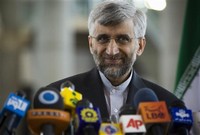Nuclear Talks in Geneva: Iran Still Unwilling to Discuss Country's Controversial Nuclear Program
Thursday a Western diplomat close to the meeting said, Iran's nuclear negotiator Saeed Jalili touched upon the country's nuclear program in his opening statement at negotiations with six world powers in Geneva.

He said that Iran's nuclear negotiator mentioned Tehran's disputed nuclear program "in a general way" in his opening statement, even though Jalili and other Iranian officials had said they would not be willing to discuss Tehran's "nuclear rights" at the one-day talks in Geneva.
"The EU3 (Britain, France and Germany) restated that the July 2008 offer is still on the table," the diplomat, who was present at the talks, said on condition of anonymity.
It was also reported, the Western diplomat said the Europeans present re-proposed their offer for staged talks, while stressing that the revelation of a new secret site had made a solution to the diplomatic impasse urgent.
Iran reiterated the broad range of issues it wants to discuss, touching on the nuclear question only towards the end. "The key session will be this afternoon," the diplomat said.
The United Nations Security Council members and Germany -- known as the P5+1-- believe the exposure of the second enrichment site has given them new leverage to persuade Iran to agree to a "freeze-for-freeze" proposal. Under the proposal, Iran would stop expanding its fuel program in exchange for a halt to new U.N. sanctions. That temporary pause would set the stage for more wide-ranging talks, offering Iran trade and economic benefits in exchange for a permanent solution, such as suspension of its nuclear fuel program, The Wall Street Journal reports.
The Iranian press adopted a bullish tone towards the talks, saying that Iran was not prepared to take part in them with its hands tied and that it was up to the West to show it had moved beyond its previous entrenched positions.
An Israeli paper called for tougher sanctions against Iran, saying that time was running out to curb the country's nuclear ambitions, while the pan-Arab and Middle Eastern Arabic press doubted that either side would be prepared to give much ground at Geneva, BBC News reports.
Subscribe to Pravda.Ru Telegram channel, Facebook, RSS!


